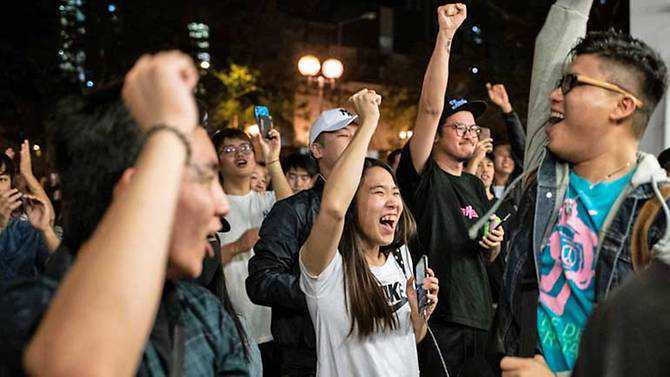Record turnout in Hong Kong local elections amid calls for full democracy
25 November, 2019

Hong Kong residents turned out in huge numbers on Sunday (Nov 24) to vote in district council elections seen as a test of support for chief executive Carrie Lam following six months of anti-government protests, and polling took place with no major disruptions.
The Electoral Affairs Commission said about 71 per cent of the 4.13 million citizens registered to vote had cast their ballots across Sunday as the count began.
It was the highest turnout in Hong Kong's history of district council elections since they were established following the handover from British rule in 1997.
Results from 235 races tabulated early on Monday morning by the South China Morning Post showed 196 anti-government candidates winning their races as opposed to 27 pro-Beijing establishment candidates and 12 independents.
The selection of 452 councillors - handling community-level concerns such as bus routes and garbage collection - traditionally generates little excitement, but has taken on new significance following months of political unrest.
First results began to trickle in after midnight.
Jimmy Sham, a candidate for the Civil Human Rights Front, which organised some of the anti-government rallies, won his contest and said the voter numbers should be a sign to the government that it should listen to their voices.
"This election is special because it is a formal confrontation between pro-establishment and pro-democracy parties after months of unrest caused by the misstep of government," he told Reuters, standing on crutches weeks after he was beaten by men with hammers during a rally in October.
Casting her ballot, the Beijing-backed Lam pledged that her government would listen "more intensively" to the views of district councils in the city.
"I hope this kind of stability and calm is not only for today's election, but to show that everyone does not want Hong Kong to fall into a chaotic situation again," Lam said.
If the anti-government campaigners gain control, they could secure six seats on Hong Kong's semi-representative Legislative Council and 117 seats on the 1,200-member panel that selects its chief executive.
The protests started over a now-withdrawn extradition Bill that would have allowed people to be sent to mainland China for trial but rapidly evolved into calls for full democracy, posing the biggest popular challenge to Chinese President Xi Jinping since he came to power in 2012.
They have at times forced the closure of government, businesses and schools as police used tear gas, rubber bullets and water cannon in response to petrol bombs and rocks.
The run-up to the election was marked by attacks on candidates, with one stabbed and wounded and another having part of his ear bitten off.
Ming Lee, 26, who works in event production, said she hoped the higher turnout would benefit the opposition camp that is battling some seats that were once uncontested and dominated by pro-Beijing candidates.
"I hope this vote can counter the voice of the pro-establishment, so as to bring in more voices from the democrats," she said. "The social problems encouraged people to vote and to focus on political issues."
Restaurant manager Jeremy Chan, 55, saw the elections as offering Beijing supporters a chance to share their opinions.
"They believe they are fighting for democracy, fighting for Hong Kong, but the rioters only listen to what they want to hear," Chan said, citing vandalism of businesses seen as pro-Beijing. "Freedom of speech is lost."
UNIVERSITY STAND-OFF
Sunday was also the seventh day of a stand-off at Polytechnic University, whose campus has been surrounded by police as some protesters hid out on the grounds.
"The district council election is almost like a referendum on recent months of social activity," said a protester clad in a red university tracksuit, his face covered by a red mask.
"My personal liberty to vote has been violated," said the protester, who said he feared being seized by police if he tries to escape from the campus.
Late on Sunday, night paramedics and police were seen escorting a young man in a wheelchair from the campus.
A professor at the university said the man had been found, weak and alone, in one of the rooms on the sprawling site.
Demonstrators are angry at what they see as Chinese meddling in the freedoms promised to the former British colony when it returned to Chinese rule in 1997. They say they are also responding to perceived police brutality.
China denies interfering and says it is committed to the "one country, two systems" formula for the autonomy of Hong Kong. Police say they have shown restraint in the face of potentially deadly attacks.
VOTER COMPLAINTS
Electoral affairs chief Barnabus Fung said there had been 3,638 complaints on Sunday, mostly related to the long queues at polling stations.
Well-known anti-government advocate Alexandra "Grandma" Wong, who was detained in the city of Shenzhen over the border from Hong Kong in August, said this was "the day that we are longing for".
"Because I was detained in Shenzhen, my ballot has become a wasted paper. This breaks my heart. Please help add oil for me and vote. All the Best!!! Be Safe!!!" she wrote according to a message on the Lennon Wall protest movement Facebook page.
It was not clear for how long Wong, who became a fixture at protests carrying a large British Union Jack flag, was detained.
Speaking to supporters outside a polling station shortly before it was announced that he had lost in his challenge to a long-time incumbent, anti-government candidate Leung Kwok-Hung, known as "Long Hair", said he was touched by the high turnout but that the political problems were far from solved.
"After the election is over, there is still a long road ahead ... Hong Kong people need to continue to fight hard," he said.
Source:
TAG(s):
